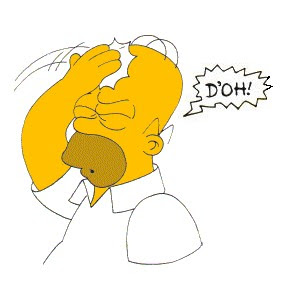 Over at Triablogue, Reformed blogger Steve Hays has posted some thoughts in defense of trinitarian theology. As best I can tell, he’s never really had a developed view of the matter. He’ll pop out some wild personal speculations from time to time, but mostly he hunkers down in apologist mode, which is: the Trinity is obviously taught by the Bible, the Trinity is obviously essential to Christian theology, all real Christians have always been trinitarians.
Over at Triablogue, Reformed blogger Steve Hays has posted some thoughts in defense of trinitarian theology. As best I can tell, he’s never really had a developed view of the matter. He’ll pop out some wild personal speculations from time to time, but mostly he hunkers down in apologist mode, which is: the Trinity is obviously taught by the Bible, the Trinity is obviously essential to Christian theology, all real Christians have always been trinitarians.
His most recent post, though, is instructive, if a bit muddled. It is a variation on the common apologists’ theme which I’ve called “The Standard Opening Move.”
He starts,
Let’s begin with a crude formulation of the Trinity:
i) There is one God
ii) The Father is God
iii) The Son is God
iv) The Spirit is God
v) The Father is not the Son, &c.
 Unfortunately, these aren’t sufficient for a trinitarian theology. One can easily interpret these sentences in a unitarian way, or in a modalist / Oneness way. Where’s the tripersonal god part? (He’s assuming that i-v imply it… but just look at them!) But I think his point is that the trinitarian will be committed to these, on some interpretations or other. Yes – that’s right. Back to Steve:
Unfortunately, these aren’t sufficient for a trinitarian theology. One can easily interpret these sentences in a unitarian way, or in a modalist / Oneness way. Where’s the tripersonal god part? (He’s assuming that i-v imply it… but just look at them!) But I think his point is that the trinitarian will be committed to these, on some interpretations or other. Yes – that’s right. Back to Steve:
On the face of it, this appears to be formally contradictory or polytheistic. Now a formal contradiction is just a verbal contradiction rather than a logical contradiction, so that, of itself, isn’t all that concerning.
If ii-iv each imply that the “Person” in question is a god, then given that they numerically differ (v), they can’t be the same god, but must be different gods. But then i is false. So i-v seem contradictory on the assumption I start this paragraph. And that assumption is implied my trinitarian traditions on which each “Person” alone “is God” or is fully divine, e.g. the “Athanasian” creed.
BTW a mere verbal contradiction (e.g. “I’m tired but I’m not”) isn’t the same as a formal contradiction (e.g. P and not-P). The first is supposed to have to do with the surface, grammatical structure, while the latter is supposed to be about the deep or true formal structure of the propositions expressed. But I think he’s gesturing at the point that not every apparent (formal) contradiction really is one, which is true and important. He continues,
If, however, we say that “God” has the same sense throughout, then it’s much harder to eliminate a logical contradiction.
2. But suppose we don’t define “God” in the same sense throughout.
Here’s his main idea, the “meat” of the post, wherein he tries to make a distinction to banish the contradictions.
Suppose we introduce a distinction between “God” as an abstract noun and “God” as a concrete noun. As an abstract noun, “God” denotes divinity, divine nature. As a concrete noun, “God” denotes the particular being who is God (like an abstract particular). Let’s plug that semantic distinction into a more refined formulation of the Trinity:
i) There is one God (concrete noun)
ii) The Father is God (abstract noun)
iii) The Son is God (abstract noun)
iv) The Spirit is God (abstract noun)
v) The Father is not the Son, &c.
Not only does that dissolve the formal contradiction, but there’s no prima facie logical contradiction either. This is not to deny that the persons of the Trinity are individuals, but the semantic distinction concerns the definition of “God”, and not their particularity as distinct individuals.
This move, I think, is confused. “Divinity” is not a meaning of “God” by itself. Rather, “is God” can express “is divine.” Notice that in this revised i-v, “is” in i and v must mean “is numerically identical to” – it is numerical identity which is denied three times in v, and i asserts there to be one which just is (is numerically identical to) God. But if we read “is” is the “is” of identity throughout, it makes nonsense of ii-iv. The Son, etc. can’t be numerically identical to a property. (Yes, I know the divine simplicity folk disagree.)
I think what Steve’s really getting at is the difference between numerical identification and mere predication (description). i and v involve the first, and ii-iv involve the second. So what his revised sentences really amount to is this.
i) There is one God.
ii) The Father is divine.
iii) The Son is divine.
iv) The Spirit is divine.
v) The Father is not the Son, &c.
 Has this eliminated any appearance of incoherence? No! The sort of divinity at issue in catholic tradition is the sort that implies that one is a god. But then ii-iv entail that each is a god. And when we add v, we get that there are at least three gods. But this contradicts i.
Has this eliminated any appearance of incoherence? No! The sort of divinity at issue in catholic tradition is the sort that implies that one is a god. But then ii-iv entail that each is a god. And when we add v, we get that there are at least three gods. But this contradicts i.
D’oh! We’re just spinning our wheels.
Finally, Steve admits what I pointed out at the start – that i-v don’t fully express any trinitarian theology.
Now, I don’t think a simple formulation of the Trinity can do it justice; I don’t think individual words are adequate to capture the conceptual richness; but as simple formulations go, that’s a good approximation.
The point doesn’t help his apologetic project here, of banishing apparent incoherence. The reason is that if trinitarian theology requires at least i-v, then whatever more is required, the theory is still stuck with the seeming incoherence of i-v.
The only ways out are denying some of i-v or coming up with a theory which provides a different interpretation of i-v. There are some out there, but none can claim to be “the” doctrine long believed by catholic Christians.
What a Protestant should be wondering is whether scripture really authorizes ii-iv in the same sense. In my view, it implies ii understood as making a numerical identity claim, and not only as a description of the Father.

Steve replies here: http://triablogue.blogspot.com/2017/01/stuck-in-rut.html Basically all off-the-cuff insults, with a few little gestures at reply strewn in.
Here’s one: ” as a concrete noun, “God” is quantitative” I think he means that “God” can be used as a singular referring term. Right, that’s the almost always the function of “ho theos” and “theos” in the NT, the referent almost always being the Father. A problem for Trinity theories!
“Moreover, divinity is only “a property” in the sense that it’s a singular noun. But, of course, singular nouns can function as collective nouns, &c. “Divinity” in the sense of the divine nature is an umbrella term for a set of attributes.”
There seems to be a confusion in his mind between “divinity” (the word, the term) and divinity (the property which only God has). Yes, we should think that divinity implies or consists in various attributes. But this isn’t to the point.
“To the contrary, that clearly eliminates the “appearance” of incoherence.”
Nuh uh! Here he simply chooses to ignore this important point, in light of which his i-v appear incoherent. Again, I said:
“The sort of divinity at issue in catholic tradition is the sort that implies that one is a god. But then ii-iv entail that each is a god. And when we add v, we get that there are at least three gods. But this contradicts i.”
More “Nuh uh!!” from him:
“No, it [divinity] entails that each person has the divine nature or divine attributes.”
Right. And *by definition* what has the divine nature is a god, and what has all the divine attributes is a god, just as having human nature implies being a human. This is just common philosophical usage (although in many ancient sources a “nature” can instead by a concrete individual being, like a god or a man).
Paraphrase of his reply: you’re bad and an idiot. And there *is* no problem here.
http://i1.kym-cdn.com/photos/images/newsfeed/000/003/866/nfNeT7YvTozx0cv7ze3mplZpo1_500.gif
Comments are closed.